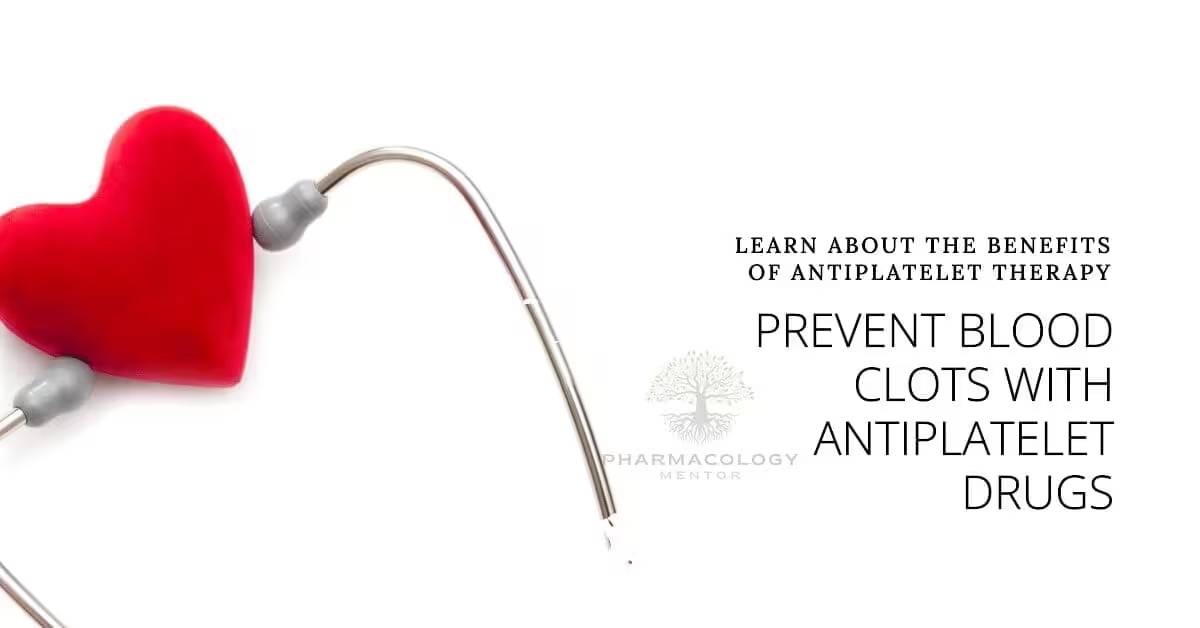Antiplatelet drugs inhibit platelet activation and aggregation, thereby reducing the risk of arterial thrombus formation—a critical strategy in preventing and managing cardiovascular diseases like myocardial infarction, stroke, and peripheral arterial disease.
Classification & Mechanisms of Action
| Class & Examples | Mechanism | Key Indications |
|---|---|---|
| COX-1 Inhibitors Aspirin | Irreversibly inhibits cyclooxygenase-1 (COX-1), blocking thromboxane A2 (TXA2) synthesis and platelet aggregation | ACS, stroke, PAD, primary/secondary prevention |
| ADP Receptor (P2Y12) Blockers Clopidogrel, prasugrel, ticagrelor, cangrelor | Block P2Y12 receptor, inhibiting ADP-mediated platelet activation | ACS, PCI, stent placement, stroke prevention |
| GP IIb/IIIa Inhibitors Abciximab, eptifibatide, tirofiban | Block final common pathway for fibrinogen-mediated platelet aggregation | Acute coronary syndromes, PCI adjunct |
| Phosphodiesterase Inhibitors Dipyridamole, cilostazol | Increase cAMP/cGMP within platelets, decreasing activation; vasodilatory | Stroke prevention, intermittent claudication |
| PAR-1 (Thrombin receptor) Antagonists Vorapaxar | Block PAR-1, inhibiting thrombin-mediated effects | History of MI, PAD; not for stroke |
| TXA2 Synthase/TP Receptor Inhibitors (experimental) | Inhibit synthesis/action of TXA2 | Future/difficult cases |
| Collagen Receptor Antagonists (experimental) | Inhibit platelet GPVI receptor activation | Research phase |

Major Drugs: Mechanism, Use, and Key Features
| Drug | Mechanism | AUC Dose | Main Clinical Use | Adverse Effects |
|---|---|---|---|---|
| Aspirin | COX-1 inhibitor | 75–325 mg/day | ACS, stroke, PAD prevention, as DAPT with P2Y12 Inhibitor | GI upset, bleeding, asthma, allergy |
| Clopidogrel | Irreversible P2Y12 antagonist | 75 mg/day | ACS, PCI, stent, stroke, aspirin allergy | Bleeding, TTP, slow onset, resistance |
| Prasugrel | Irreversible P2Y12 antagonist | 10 mg/day | ACS, PCI (not stroke/TIA history) | Bleeding, CI with stroke/TIA |
| Ticagrelor | Reversible P2Y12 antagonist | 90 mg BID | ACS, PCI | Dyspnea, bradycardia, bleeding |
| Abciximab | GP IIb/IIIa inhibitor | IV bolus/infusion | PCI adjunct | Thrombocytopenia, bleeding |
| Eptifibatide, tirofiban | GP IIb/IIIa inhibitors | IV infusion | PCI adjunct | Bleeding, thrombocytopenia |
| Dipyridamole | PDE/adenosine uptake inhibitor | 200 mg BID (w/aspirin) | Stroke prevention with aspirin | Headache, GI upset |
| Cilostazol | PDE3 inhibitor | 100 mg BID | Intermittent claudication | Headache, GI upset, contraindicated in heart failure |
Dual Antiplatelet Therapy (DAPT)
- DAPT = aspirin + P2Y12 inhibitor (clopidogrel/prasugrel/ticagrelor)
| DAPT Indication | Typical Duration |
|---|---|
| Acute coronary syndromes (ACS) | 12 months |
| Drug-eluting stent (DES) | ≥6 months |
| Bare-metal stent (BMS) | ≥1 month |
| Stroke/TIA/secondary prevention | 21–90 days |
Comparative Table: P2Y12 Inhibitors
| Feature | Clopidogrel | Prasugrel | Ticagrelor |
|---|---|---|---|
| Onset | ~2 hours | ~30 min | ~30 min |
| Potency | Moderate | High | High |
| Reversibility | Irreversible | Irreversible | Reversible |
| Metabolism | CYP2C19 (variability, resistance common) | Non-CYP2C19 | Non-CYP2C19 |
| Bleeding Risk | Moderate | Higher | Higher |
| Unique issues | Genetic resistance | CI in prior stroke/TIA | Dyspnea, bradycardia |
| Special notes | Preferred in aspirin allergy | Avoid in stroke/TIA | Use caution with bradyarrhythmias |
New Directions
- Novel agents: Vorapaxar (PAR-1 antagonist), investigational drugs targeting collagen/vWF/alternate pathways
- Clopidogrel analogs: Designed to overcome resistance, improve efficacy
References
- Goodman & Gilman’s The Pharmacological Basis of Therapeutics. 13th ed. New York: McGraw-Hill; 2017.
- Iqbal AM, et al. Antiplatelet Medications. StatPearls [Internet]. 2022 Nov 6.
- Dual antiplatelet therapy in ACS. Sevenpublicacoes; Sep 2024.
- Antiplatelet therapy: present status and future directions. Int J Basic Clin Pharmacol. 2017;3(2):260–268.
- Promising clopidogrel analogs may overcome resistance. SciDirect. Sep 2025.
- Clopidogrel outperforms aspirin monotherapy after PCI. ACC. Mar 2025.
Key Clinical Pearls:
- Antiplatelet drugs reduce arterial thrombosis, not venous clots.
- DAPT is standard post-ACS/PCI; balance ischemic and bleeding risk.
- Drug selection based on clinical scenario, genetics, cost, drug interactions, contraindications.
Medical Disclaimer
The medical information on this post is for general educational purposes only and is provided by Pharmacology Mentor. While we strive to keep content current and accurate, Pharmacology Mentor makes no representations or warranties, express or implied, regarding the completeness, accuracy, reliability, suitability, or availability of the post, the website, or any information, products, services, or related graphics for any purpose. This content is not a substitute for professional medical advice, diagnosis, or treatment; always seek the advice of your physician or other qualified health provider with any questions you may have regarding a medical condition and never disregard or delay seeking professional advice because of something you have read here. Reliance on any information provided is solely at your own risk.

